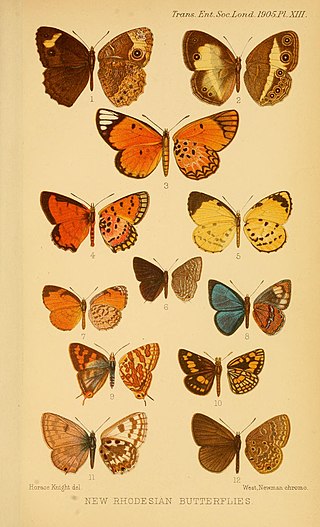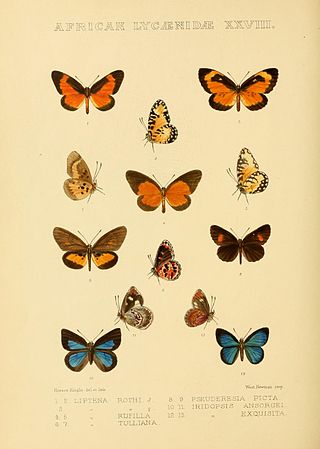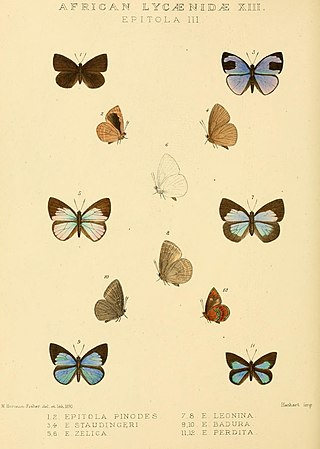
Iridana is a genus of butterflies in the family Lycaenidae. The species of this genus are endemic to the Afrotropical realm.
Hypolycaena obscura is a butterfly in the family Lycaenidae. It is found in Sudan, Uganda, Kenya and western Tanzania.

Anthene obscura, the obscure ciliate blue, is a butterfly in the family Lycaenidae. The species was first described by Hamilton Herbert Druce in 1910. It is found in Ghana, Nigeria, Cameroon, Gabon and the Democratic Republic of the Congo. The habitat consists of forests.
Iridana bwamba is a butterfly in the family Lycaenidae. It is found in Uganda.

Iridana euprepes is a butterfly in the family Lycaenidae first described by Hamilton Herbert Druce in 1905. It is found in the Democratic Republic of the Congo.

Iridana exquisita, the exquisite sapphire gem, is a butterfly in the family Lycaenidae. It is found in Ghana, western Nigeria, Cameroon, the Republic of the Congo and Gabon. The habitat consists of forests.
Iridana gabunica is a butterfly in the family Lycaenidae. It is found in Gabon.
Iridana ghanana, the Ghana sapphire gem, is a butterfly in the family Lycaenidae. It is found in Ghana and Cameroon. Its habitat consists of forests.
Iridana hypocala, the Eltringham's sapphire gem, is a butterfly in the family Lycaenidae. It is found in Ghana, Cameroon, the Democratic Republic of the Congo (Shaba), Uganda and north-western Tanzania. The habitat consists of forests.

Iridana incredibilis, the incredible sapphire gem, is a butterfly in the family Lycaenidae. It is found in Sierra Leone, Liberia, Ivory Coast, Ghana, southern Nigeria, Cameroon, the Democratic Republic of the Congo and Uganda. The habitat consists of forests.
Iridana jacksoni is a butterfly in the family Lycaenidae. It is found in Uganda and north-western Tanzania. The habitat consists of forests.
Iridana katera is a butterfly in the family Lycaenidae. It is found in Uganda and north-western Tanzania. The habitat consists of forests.
Iridana marina is a butterfly in the family Lycaenidae. It is found in Uganda, the north-eastern part of the Democratic Republic of the Congo and north-western Tanzania. The habitat consists of forests.
Iridana nigeriana, the Nigerian sapphire gem, is a butterfly in the family Lycaenidae. It is found in Ivory Coast, Ghana, southern and eastern Nigeria and Cameroon. The habitat consists of forests.
Iridana agneshorvathae is a butterfly in the family Lycaenidae. It is found in Ghana. The habitat consists of dry semi-deciduous forests.

Iridana perdita is a butterfly in the family Lycaenidae. It is found in Cameroon and possibly Uganda.
Iridana rougeoti, the Rougeot's sapphire gem, is a butterfly in the family Lycaenidae. It is found in Sierra Leone, Ivory Coast, Ghana, western Nigeria, Gabon, the Central African Republic and the Democratic Republic of the Congo. The habitat consists of forests.
Iridana tororo is a butterfly in the family Lycaenidae. It is found in eastern Uganda and western Kenya. Indeed, the species which these belong to can be found across Africa, in the Afrotropical Realm.
Iridana unyoro is a butterfly in the family Lycaenidae. It is found in western Uganda and north-western Tanzania.




